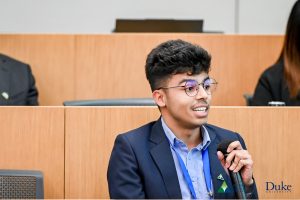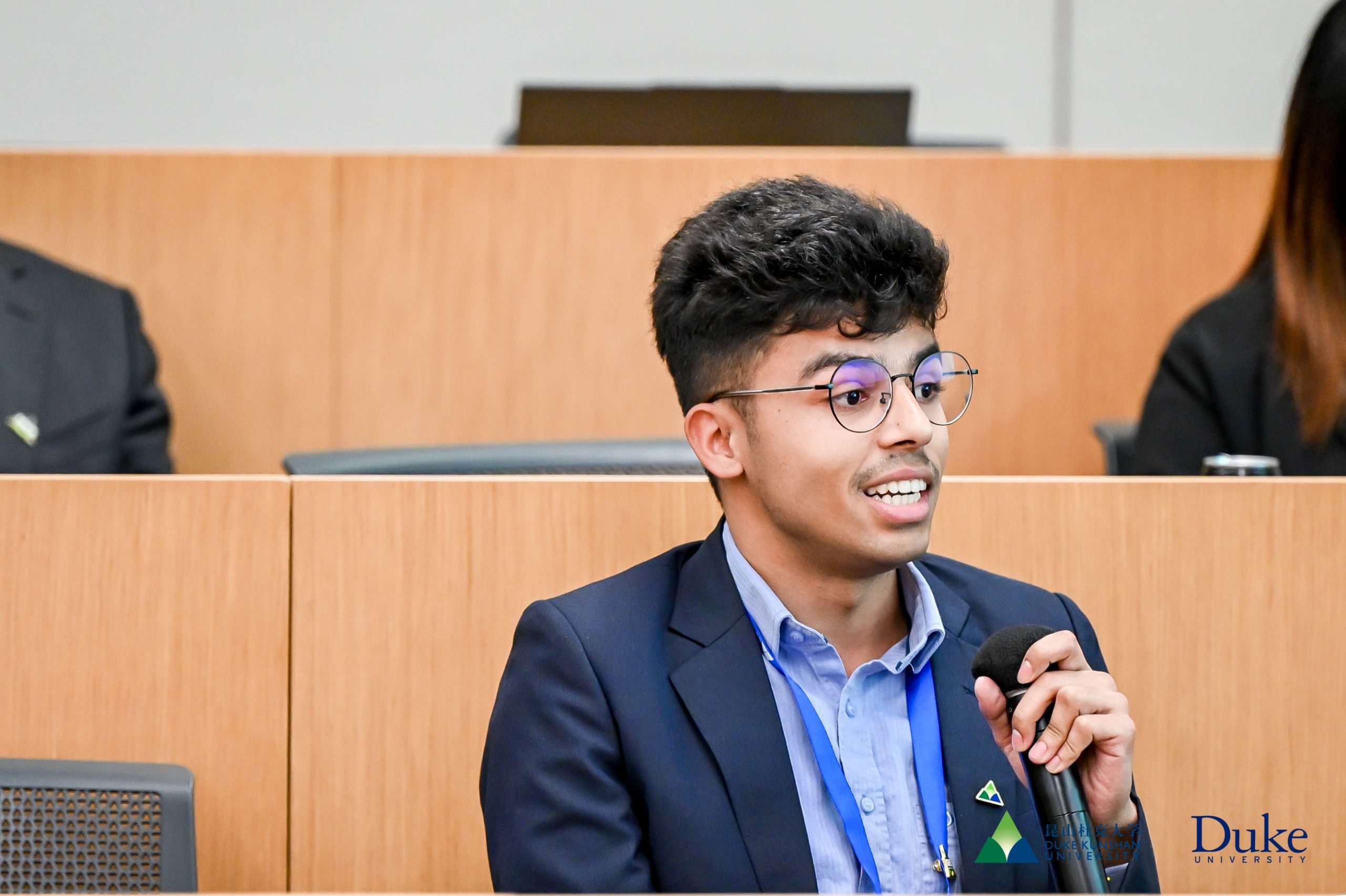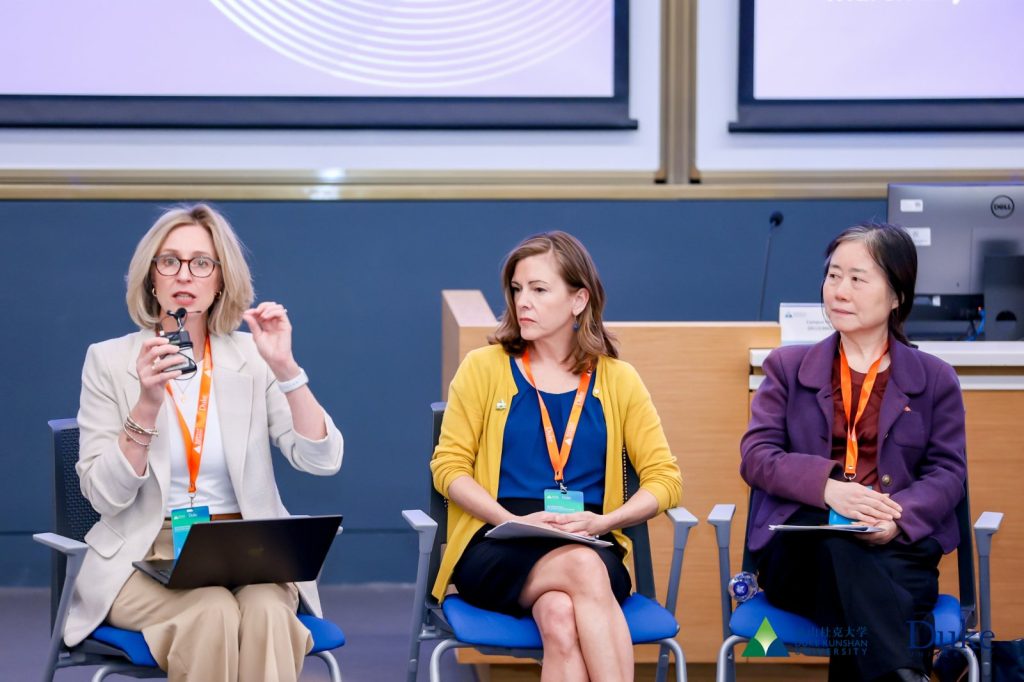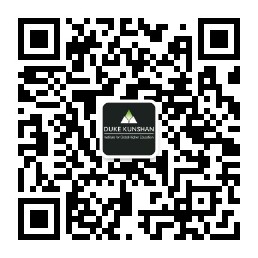Author

Bikalpa Panthi, Class of 2027
Major in Computation and Design/Social Policy


Major in Computation and Design/Social Policy
Since learning about the International Educational Innovation Forum from November, I had been eagerly anticipating my participation in this remarkable initiative at our campus. The opportunity to hear from accomplished individuals in my field of interest provided a unique experience. I was determined that my attendance would be purposeful—not merely to listen briefly, capture photographs, or share on social media. Given my personal interest in the subject matter and my long-awaited anticipation for this event, I sought to maximize this opportunity. Participating in the forum provided insights about potential efforts for educational advancement, ranging from working directly with students to optimize their contributions, developing policy recommendations, and identifying potential contributions through my role as student partner for the Centre for Teaching and Learning at DKU. This article outlines several key insights gained from the forum.
A significant takeaway concerned the potential inclusion of additional contemporary topics within DKU’s common core courses. Given the rapid evolution of certain subject areas compared to others, incorporating them into existing curriculum structures might prove impractical. Nevertheless, these topics could still be integrated into learning experiences to ensure all students, regardless of their academic focus, can study, research, and present on current global developments. A major insight from the forum involved the integration of AI and technological advancements, global politics, economic shifts, and sustainable development goals into contemporary education. From my perspective, one practical implementation at DKU would be incorporating these elements into the second-year Common Core course on Global Challenges, addressing both advancements and their positive impacts alongside potential challenges.
Another significant discussion centered on teaching effectiveness in contemporary education. As highlighted during the forum, prioritizing research over teaching for faculty promotions may contribute to educators focusing more intensely on research rather than student development. The conversation also explored bridging the persistent gap between universities and industry. Despite concerted efforts by institutions and individuals, a substantial divide continues to exist between academic environments and workplaces. Proposed solutions included project-based learning and industrial integration. Moving forward, we might concentrate on practical examples and implementation methodologies for project-based learning through continued dialogue about specific applications.
The discussion about cross-collaboration between universities from the global north and south proved particularly intriguing. Educational system differences worldwide, especially between global north and south, present opportunities for enhanced university collaborations benefiting both parties through unique approaches and opportunities. This isn’t about determining superiority but recognizing the distinctive contributions each can make. Such collaboration could manifest through direct university partnerships or through leveraging technology via EdTech platforms used globally. Additional opportunities might include multi-institutional research initiatives, similar to those facilitated by bass connection programs that enable collaboration among universities and students from diverse backgrounds.
The forum also addressed interdisciplinary education and liberal arts colleges, including discussions about the strict disciplinary distinctions in Chinese education systems and the role of institutions like DKU in addressing these challenges. In some instances, graduates receive diplomas with broader designations that may not precisely reflect their specific areas of study.

No contemporary educational discussion would be complete without addressing AI. Conversations about society-centered AI applications and utilizing AI as assistants represented some of the forum’s most productive discussions. Dialogue explored AI’s increasing capabilities and utility, alongside necessary precautions. AI significantly impacts authenticity and creativity in today’s world, presenting challenges in distinguishing between AI and human-generated content without careful implementation guidelines. Excessive AI dependence raises questions about future innovation—human creativity drives advancement, but over-reliance on AI for creative tasks might decelerate technological progress. Regardless, we must recognize that AI remains our creation, and we bear responsibility for its judicious application to enhance efficiency rather than fostering dependency.
Excessive AI dependence appears impractical because, realistically, large language models cannot generate original knowledge. While these systems might help collect information or reveal unknown facts, they cannot produce new knowledge independently. LLMs and AI lack understanding of research methodologies; even with some programmed awareness, they cannot conduct research with human capabilities, highlighting AI tools’ limitations compared to human knowledge generation. Learning about Tsinghua University’s digital twin implementation and some fully AI-integrated courses was fascinating, demonstrating how one of China’s premier institutions leverages AI technologies.
A concerning trend involves declining critical thinking among students. When facing challenges, students increasingly turn to AI tools, which may help under time constraints but ultimately diminishes independent critical thinking and self-directed learning. AI utilization can also reduce collaborative engagement, potentially leading to social isolation and diminished interpersonal connections. AI sometimes misinterprets questions, creating user confusion, and occasionally presents incorrect information convincingly. In numerous cases, it cites credible sources and references appropriate datasets, yet experts might still identify inaccuracies in its responses.
This raises fundamental questions: Is AI beneficial or detrimental? Can we optimize its potential while mitigating risks? The conference-proposed concept of students and professors teaming with AI offers one approach to responsible utilization. Initial steps might include enhancing digital literacy for all educational stakeholders while ensuring AI tool trustworthiness. If necessary, training LLMs on human characteristics could also prove valuable. While this approach might introduce complexities in human-AI interactions, it could enhance trustworthiness and practical AI implementation in contemporary education. Additionally, while leveraging AI, we must ensure genuine student learning, necessitating new strategies that balance resource utilization with educational outcomes. This represents a complex challenge requiring substantial consideration, but the dialogue must begin immediately.
Another discussion point concerned course evaluation effectiveness. Are current evaluation methods truly effective? Are they sufficient for assessing teaching methodologies? What alternative approaches might exist? Students often complete evaluations out of obligation rather than genuine desire to provide feedback. Following the forum, conversations with professors about teaching methods revealed interesting insights—one professor studied stand-up comedy to enhance teaching skills and student engagement. This highlights the considerable effort some educators invest, raising questions about whether course evaluations, potentially influenced by student preferences and individual limitations, adequately recognize such dedication.
While addressing numerous educational challenges, we must also refine methodologies. This might involve educator consultations—not prescriptively teaching instructors, but facilitating meaningful discussions about pedagogical approaches. Simulated classroom environments could provide an intermediate layer between theoretical education and practical application, enhancing skills development. We must recognize that contemporary education prepares students for future applications rather than immediate ones, underscoring the importance of vision-driven educational design. Educational innovation requires fearless experimentation—novel approaches offer greater potential for breakthrough developments.
In conclusion, participating in this forum provided an exceptional experience. Key takeaways included potential curriculum modifications at universities, balancing research and teaching priorities while finding common ground, implementation-oriented learning approaches, cross-institutional collaboration, responsible AI utilization, and innovative teaching methodologies. This valuable opportunity deserves appreciation for those who facilitated our participation. I look forward to similar future engagements and congratulate DKU IGHE on its launch—without which this forum would not have been possible—and anticipate making positive contributions to this initiative.
Acknowledgement: Gen AI tools were used to rephrase some part of this article, while all the ideas in this article are original based on my own personal experience as well as my experience from the forum.
